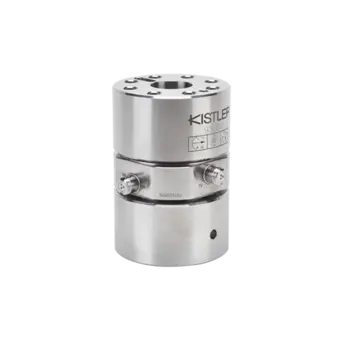Sensor de fuerza-par piezoeléctrico de 6 ejes (Fx, Fy, Fz, Mx, My, Mz) / 9306A

- Sensor de fuerza-par de 6 ejes con rangos de medición Fx, Fy: -5 ... 5 kN, Fz: -5 ... 10 kN y Mx, My, Mz: -200 ... 200 Nm
- Conexión: 2 x V3 neg.
- Dimensiones: PxAl (mm) 62x90
Measuring ranges
Este sensor de fuerza-par de 6 ejes mide todas las fuerzas y los momentos correspondientes en los tres ejes ortogonales. Todas las fuerzas y momentos se capturan como señales físicas piezoeléctricas y no es necesario calcularlas. La exclusiva configuración de medición de este sensor piezoeléctrico multieje permite un diseño extremadamente pequeño y compacto. Por lo tanto, es posible realizar modelos concisos de procesos dinámicos y cuasistáticos tridimensionales incluso en instalaciones estrechas. Sensores de fuerza-par piezoeléctricos de 6 ejes pretensados con dos bridas de montaje. Mide fuerzas y pares de reacción en las direcciones de tracción y compresión. Una fuerza o un par de reacción generan una carga eléctrica proporcional. Ésta es transferida por un electrodo al conector correspondiente. El sensor de fuerza-par multieje está formado por discos de cuarzo de gran superficie, por lo que es muy rígido. La elevada frecuencia natural resultante es un requisito previo para las mediciones de fuerza y par altamente dinámicas. Los dos conectores V3 neg. de 3 polos están provistos de un bloqueo contra torsión. Un conector para cada señal de fuerza y par. Una vez instalado correctamente, el Sensor de fuerza-par de 6 ejes está inmediatamente listo para su uso sin necesidad de recalibración.
